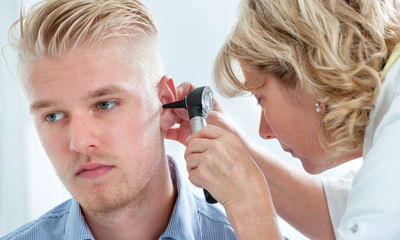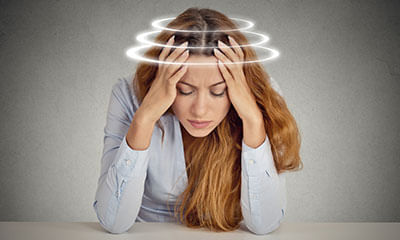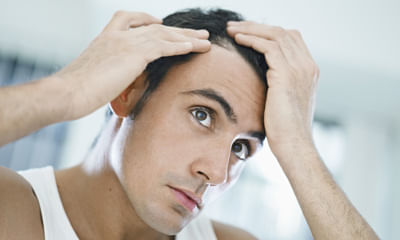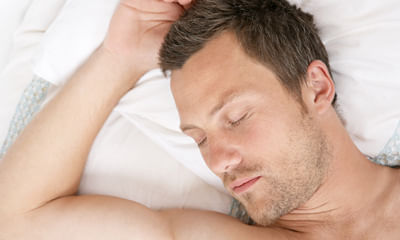Labyrinthitis Treatment
I am diagnosed with labyrinthitis and suffer with body imbalance, floating & body side pulling sensation. Any speciality ...
Ask Free Question
I am sorry to hear about your concern but will be happy to assist you. The most common symptoms of labyrinthitis are: dizziness or feeling that everything around you is spinning (vertigo) feeling unsteady and off balance – you might find it difficult to stay upright or walk in a straight line. Feeling or being sick. Let's connect over a call so that we can discuss your concern in details and make a suitable treatment plan for you.
My father, 55y, has been diagnosed with vestibular schwanomma in 2017. The problems being faced are vertigo (like thrice ...
Ask Free Question
I am sorry to hear about your concern but will be happy to assist you. If your peripheral vertigo is caused by an inner ear infection or a disease, you may have some pain or a feeling of fullness in your ear. In labyrinthitis and meniere's disease, you may have hearing loss and tinnitus (ringing of the ears) in one or both ears along with the vertigo. Let's connect over a call so that we can discuss your concern in details and make a suitable treatment plan for you.
From last two months I am having problem in concentrating and having dizziness too. While sitting I feel like my head is ...
Ask Free Question
Your symptoms--problem in concentrating and having dizziness too. While sitting I feel like my head is moving to and fro with blur vision.These symptoms may have developed over a period of time. Very effective treatment is available in homoeopathy for this chronic problem. Many Lybrate users are taking homeopathic treatment for this. Homeopathic treatment is painless and safe. No side effects. You need comprehensive treatment and it takes some time. Please start taking homeopathic medicine, preliminary dose Arsenicum album 200-once daily in the morning for 5 days. Consult me through Lybrate by booking online consultation-( commencing from text consult Rs 149) for further more comprehensive prescription and treatment
Sir I feel like chakkar but never fall .when I stand or sit for long I feel chakkar like unable to concentrate in any th ...
Ask Free Question
Vertigo is a specific type of dizziness. It is the medical term for the form of dizziness that involves a person having a strong sense that they, or their surroundings, are moving when they are standing still. The sense of movement has a spinning, swaying or revolving nature to it. Less commonly, people might feel as if they are being pushed forward or as if they are falling. Vertigo is not a fear of heights. However, some people might experience the symptoms of vertigo when looking down from a great height. Other symptoms that may come alongside vertigo are feeling sick or being sick, dizziness and loss of balance. Causes of dizziness what conditions and diseases can cause dizziness? Many different conditions can cause dizziness or sensations of being off-balance, for example, certain heart conditions, or blood disorders like anaemia. However, if you have been referred to a neurologist or an otologist, general conditions like these will usually have already been ruled out. Dizziness is also the unwanted side effect of many different medications. You should discuss any concerns you have about medication with your gp or pharmacist. Travelling by road, rail, air or sea can cause motion or travel sickness. The common symptoms are dizziness, nausea (feeling sick) and vomiting (being sick). Stress or anxiety being stressed, anxious, tense or irritable can also provoke dizziness or a sense of imbalance. This can lead to a vicious circle effect as feeling dizzy in itself can lead to feeling stressed, anxious or depressed. Meditation has been known to help with anxiety and stress, as well as talking to a psychologist or having cbt therapy. Prioritising your own relaxation time can also relieve signs of stress. Things such as exercising, taking a walk in nature, having a relaxing bath, or listening to a calming piece of music, may help to relax you. Some people also find aromatherapy helps them relax – lavender is a popular fragrance, although this might make you sleepy. It is important to note that different people find different activities relaxing, so do what best suits you. 15 low blood sugar level (hypoglycaemia) low blood sugar (glucose) levels can lead to dizziness – this is because your body doesn’t have the energy it needs to function properly. This is most common in people with diabetes. If someone with diabetes misses a meal, exerts themselves too much, or takes too much insulin, this may lead to low blood sugar. Symptoms of low blood sugar are feeling hungry, trembling or feeling ‘shaky’, and sweating. In severe cases you may lose consciousness. To treat low blood sugar levels, you should eat or drink something sugary, for example some sweets or a glass of fruit juice. Dehydration or heat exhaustion when your body does not have as much fluid as it needs, this disturbs the balance of salts and sugars, which then affects the way it functions. Symptoms of dehydration are feeling thirsty, lightheaded (dizzy), passing dark coloured strong-smelling urine, and passing urine less frequently than normal. If you are dehydrated, you should drink plenty of fluids, but try to avoid caffeine or fizzy drinks. Sipping small amounts regularly may be best if you are suffering from a stomach upset at the same time. Heat exhaustion occurs when there is low blood pressure and blood volume. This can occur after being exposed to heat for a long time. Symptoms include nausea, feeling faint and sweating heavily. If someone is suffering from heat exhaustion they should be taken to a cool place with any unnecessary clothing removed, and provided water to drink. They should feel better within approximately 30 minutes. 16 postural hypotension (low blood pressure) people with low blood pressure can be affected with dizziness after changing positions, such as standing up. This is more common in older people. Low blood pressure occurs when the blood pressure in your arteries is unusually low. If your blood pressure drops too low, not enough blood can reach your brain and this may lead to dizziness or light-headedness, or fainting. Some symptoms of low blood pressure are dizziness, loss of balance, fainting, blurred vision, a rapid or irregular heartbeat, confusion, nausea, and general weakness. Low blood pressure only needs to be treated if it is showing symptoms. Very few people are given medication to treat low blood pressure. Instead, life style changes can relieve symptoms. These include; standing up slowly, avoiding standing for long periods, wearing support stockings, limiting intake of alcohol, avoiding caffeine in the evening and eating smaller, more regular meals as opposed to large meals. Vestibular neuritis (labyrinthitis) vestibular neuritis is a viral infection of the inner ear (it is sometimes called labyrinthitis or viral labyrinthitis). Some specialists think that the problem is specifically with the nerve cells or neurons in the inner ear. Infections of the ear are usually viral and less commonly bacterial. Symptoms include a sudden onset of dizziness with a spinning sensation (vertigo), accompanied by nausea (feeling sick) and general unsteadiness. You may also experience problems with vision, hearing and causes of dizziness 17 concentration. These symptoms often develop a few days or weeks after a bad cold or influenza (the ‘flu). The initial dizziness caused by vestibular neuritis can be intense and very distressing. For the small number of people who experience prolonged or recurrent symptoms, the dizziness is not usually as intense but might be enough of a nuisance to affect their everyday lives. Depression, panic attacks, anxiety and derealisation (where your sense of reality seems ‘unreal’ or distorted) are also relatively common side effects of the disorder. If you are struggling with these issues, then your gp may refer you for counselling. Cbt is known to help, as well as relaxation techniques and meditation. For further information, see our ‘useful contacts’ section on page 40. People with vestibular neuritis often prefer to stay in bed because any movement makes the dizziness worse. You may find working difficult due a persistent feeling of ‘haziness’ or disorientation. The symptoms might last for just a few days but, in some cases, can persist for several weeks. Some people remain a little unsteady afterwards but most make a full recovery. Only a minority of people with vestibular neuritis will experience persistent, troublesome dizziness or suffer recurrences of the condition. Recurrences might be spontaneous or associated with further colds or bouts of influenza. Vestibular neuritis does not cause hearing problems. If the symptoms do not resolve completely and are still troublesome then you may be referred to an expert physiotherapist for vestibular rehabilitation. Causes of dizziness 18 the main treatment for vestibular neuritis, in its initial stage, is antivertigo drugs. These are the same type of drugs as those used to treat motion or travel sickness. Less common is ‘suppurative labyrinthitis’. This is caused by bacterial organisms infecting the labyrinth. The infection originates either in the middle ear or in the cerebrospinal fluid, as a result of bacterial meningitis.
I am 34 years old male facing problem vertigo and imbalance since last 6 months I had take vertin 16 mg tab for 1 month ...
Ask Free Question
Vertigo is a sensation of feeling off balance. If you have these dizzy spells, you might feel like you are spinning or that the world around you is spinning. Causes of Vertigo Vertigo is often caused by an inner ear problem. Some of the most common causes include: BPPV. These initials stand for benign paroxysmal positional vertigo. BPPV occurs when tiny calcium particles (canaliths) clump up in canals of the inner ear. The inner ear sends signals to the brain about head and body movements relative to gravity. It helps you keep your balance. BPPV can occur for no known reason and may be associated with age. Meniere's disease. This is an inner ear disorder thought to be caused by a buildup of fluid and changing pressure in the ear. It can cause episodes of vertigo along with ringing in the ears (tinnitus) and hearing loss. Vestibular neuritis or labyrinthitis. This is an inner ear problem usually related to infection (usually viral). The infection causes inflammation in the inner ear around nerves that are important for helping the body sense balance Less often vertigo may be associated with: Head or neck injury Brain problems such as stroke or tumor Certain medications that cause ear damage Migraine headaches For medication Consult online in private.
I have the problem of spinning as soon as I wake up in the morning. It continues for the whole day sometimes. What's the ...
Ask Free Question
Vertigo is a sensation of feeling off balance. If you have these dizzy spells, you might feel like you are spinning or that the world around you is spinning. Causes of Vertigo Vertigo is often caused by an inner ear problem. Some of the most common causes include: BPPV. These initials stand for benign paroxysmal positional vertigo. BPPV occurs when tiny calcium particles (canaliths) clump up in canals of the inner ear. The inner ear sends signals to the brain about head and body movements relative to gravity. It helps you keep your balance. BPPV can occur for no known reason and may be associated with age. Meniere's disease. This is an inner ear disorder thought to be caused by a buildup of fluid and changing pressure in the ear. It can cause episodes of vertigo along with ringing in the ears (tinnitus) and hearing loss. Vestibular neuritis or labyrinthitis. This is an inner ear problem usually related to infection (usually viral). The infection causes inflammation in the inner ear around nerves that are important for helping the body sense balance Less often vertigo may be associated with: Head or neck injury Brain problems such as stroke or tumor Certain medications that cause ear damage Migraine headaches For medication Consult online in private.
I have Tinnitus Ringing in both ears since January 2016 .I consult many doctors but Issue not resolved. I have also done ...
Ask Free Question
.1.It is due to exposure to loud noise, stress, fatigue, 2.medication like over use of Aspirin, quinine, Antibiotic, Anti depressants, 3.ear injury (externa/middle/internal/Auditory nerve problem), cold, wax in ear 4.labyrinthitis,otosclerosis, 5.Get yourself examined by ENT specialist and follow the advice and treatment.
Is there a permanent cure for tinnitus? Is there a home remedy? Please suggest me a doctor in Asansol who can treat this ...
Ask Free Question
Tinnitus It is a ringing sensation in ear. It is due to exposure to loud noise, stress, fatigue, medication like over use of Aspirin, quinine, Antibiotic, Anti depressants, overuse of aminoglycosides, erythro/vanco/neomycin/lasix, age related hearing loss, ear injury (externa/middle/internal/Auditory nerve problem), Loud noise,(some times due to cold and disappear within a week/wax in ear), drug, chemical, labyrinthitis, otosclerosis, menier’s disease (dizziness with Tinnitus) Acoustic neuroma (Tumor on acoustic nerve), head/neck Injury TMJ problem (temporo mandibular joint). It may lead to deafness. No definite surgical treatment available. Treatment- Hearing Aid/masking device, Therapeautic noise generator, Tinitus refraining therapy (TRT), Cognitive behavior therapy. Avoid smoking, Tea, coffee, chocolate Consult a good ENT specialist for proper advice.
Hello from about 2 months I have strong vertigo that do not even sleep well . I've noticed that I also dilated pupils . ...
Ask Free Question
There are 2 main causes for vertigo. 1) diseases of the ear 2) diseases of the brain. Diseases of the ear causing vertigo are bppv (benign paroxysmal positional vertigo), meniere's disease, labyrinthitis, trauma to the inner ear, toxicity due to medicines. These diseases can occur at any age and are usually associated with nausea and vomiting. Examination by an ent doctor will help to come to a diagnosis. Diseases of the brain causing vertigo are bleeding or interrupted blood supply to the cerebellum (area of the brain responsible for balance) and its connections, tumours. These conditions are commonly seen in elderly and are not associated with nausea and vomiting. They can be ruled out by mri. I hope this answered your question. Let me know if you have any other specific questions. Regards,
Sir I have a vertigo problem how this vertigo will come what is the symptoms and cure. ...
Ask Free Question
Vertigo is often caused by an inner ear problem. Some of the most common causes include: bppv. These initials stand for benign paroxysmal positional vertigo. Bppv occurs when tiny calcium particles (canaliths) clump up in canals of the inner ear. The inner ear sends signals to the brain about head and body movements relative to gravity. It helps you keep your balance. Bppv can occur for no known reason and may be associated with age. Meniere's disease. This is an inner ear disorder thought to be caused by a buildup of fluid and changing pressure in the ear. It can cause episodes of vertigo along with ringing in the ears (tinnitus) and hearing loss. Vestibular neuritis or labyrinthitis. This is an inner ear problem usually related to infection (usually viral). The infection causes inflammation in the inner ear around nerves that are important for helping the body sense balance. Treatment for vertigo depends on what's causing it. In many cases, vertigo goes away without any treatment. This is because your brain is able to adapt, at least in part, to the inner ear changes, relying on other mechanisms to maintain balance. For some, treatment is needed and may include: vestibular rehabilitation. This is a type of physical therapy aimed at helping strengthen the vestibular system. The function of the vestibular system is to send signals to the brain about head and body movements relative to gravity.




